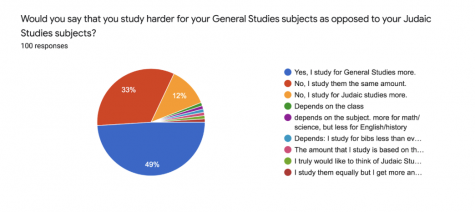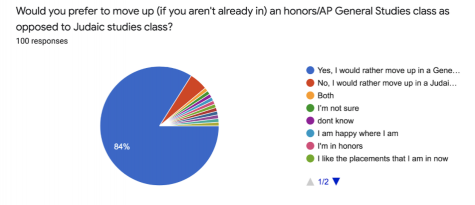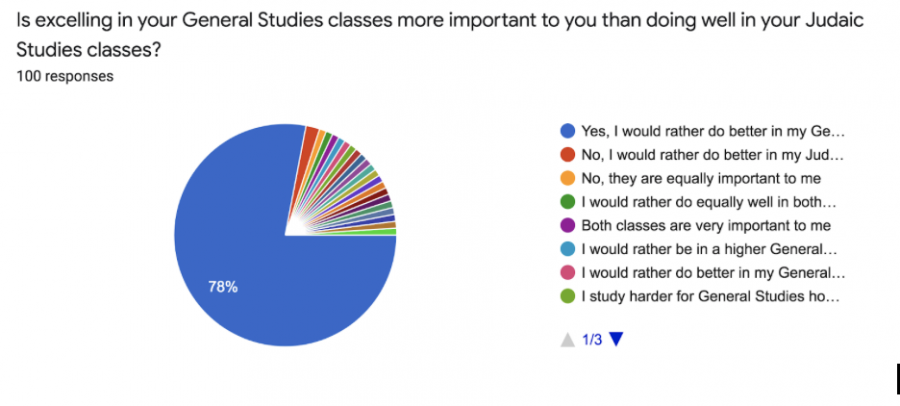General Studies vs. Judaic Studies
As a school in the Yeshiva League, Ramaz maintains a dual-curriculum, which is very rigorous and academically challenging. As a result of that, students have to learn to balance the workload of up to 11 classes every day, along with extracurriculars and other parts of their lives. That alone brings up the question of priorities, and how select classes may be valued over others. Some students would say that if they had both a math test and a Tanach test in the next week, they would prioritize studying for the math test over the Tanach test; they would consider the math grade to be more important.
In fact, 78% of students in a survey said that they would rather excel in their General Studies classes than in their Judaic Studies classes. Along with that, 84% of students said they would rather move up in an honors General Studies class over a Judaic Studies class. Why is that? A student in mostly General Studies honors classes explains her reasoning. “I would rather move up in my General Studies class because
I feel like after college, I would rather have more of an advanced knowledge of General Studies subjects for my chosen profession.” 
Many students also believe that colleges care more about your General Studies classes than Judaic Studies ones. Many students also believe that colleges care more about your General Studies classes than Judaic Studies ones. However, in response to this idea, Dana Messinger, head of the college offices at Ramaz said, “On your transcript, you’ll see that we group the general studies courses and Judaic studies courses, listing a GPA for each as well as a combined GPA. While some schools choose to focus primarily on the general studies courses, we’ve been told by competitive universities that they are looking at both curriculums and penalizing students that have a comparatively lower GPA in a whole half of their courses. Remember—these are institutions of higher learning looking for intellectually curious students, and demonstrating that you don’t try or are uninterested in courses you think count less does not go over well!” It also depends on the type of college you are applying to, and whether it’s a school with religious values. It also depends on the type of college you are applying to, and whether it’s a school with religious values.
What about the students who are in mostly lower-level General Studies classes and higher Judaic Studies classes? Surprisingly, most give the same answers as the students in higher-level General Studies classes. When asked whether they value their Judaic Studies classes over their General Studies classes, one student answered by saying, “Not really, I think General Studies are are more important.” That shows that even a student in higher-level Judaic Studies classes st ill goes with the norm of valuing General Studies classes more. In the end, most students in all different tracks say that they try to study for both types of classes equally, but if they had to pick a track they value more, whether it be because of what colleges think or what they will be doing later in life, most students value their General Studies.
ill goes with the norm of valuing General Studies classes more. In the end, most students in all different tracks say that they try to study for both types of classes equally, but if they had to pick a track they value more, whether it be because of what colleges think or what they will be doing later in life, most students value their General Studies.



